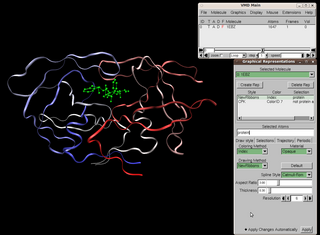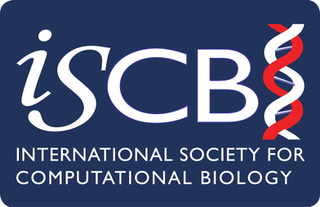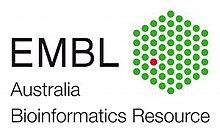
Bioinformatics is an interdisciplinary field that develops methods and software tools for understanding biological data. As an interdisciplinary field of science, bioinformatics combines biology, computer science, information engineering, mathematics and statistics to analyze and interpret biological data. Bioinformatics has been used for in silico analyses of biological queries using mathematical and statistical techniques.

Visual molecular dynamics (VMD) is a molecular modelling and visualization computer program. VMD is developed as mainly a tool to view and analyze the results of molecular dynamics simulations. It also includes tools for working with volumetric data, sequence data, and arbitrary graphics objects. Molecular scenes can be exported to external rendering tools such as POV-Ray, RenderMan, Tachyon, Virtual Reality Modeling Language (VRML), and many others. Users can run their own Tcl and Python scripts within VMD as it includes embedded Tcl and Python interpreters. VMD runs on Unix, Apple Mac macOS, and Microsoft Windows. VMD is available to non-commercial users under a distribution-specific license which permits both use of the program and modification of its source code, at no charge.

The SIB Swiss Institute of Bioinformatics is an academic not-for-profit foundation which federates bioinformatics activities throughout Switzerland.

The European Molecular Biology Laboratory (EMBL) is a molecular biology research institution supported by 25 member states, four prospect and two associate member states. EMBL was created in 1974 and is an intergovernmental organisation funded by public research money from its member states. Research at EMBL is conducted by approximately 85 independent groups covering the spectrum of molecular biology. The list of independent groups at EMBL can be found at www.embl.org. The Laboratory operates from six sites: the main laboratory in Heidelberg, and outstations in Hinxton, Grenoble (France), Hamburg (Germany), Rome (Italy) and Barcelona (Spain). EMBL groups and laboratories perform basic research in molecular biology and molecular medicine as well as training for scientists, students and visitors. The organization aids in the development of services, new instruments and methods, and technology in its member states. Israel is the only full member state located outside Europe

The Biocomplexity Institute of Virginia Tech is a research organization specializing in bioinformatics, computational biology, and systems biology. The Institute has more than 250 personnel, including over 50 tenured and research faculty. Research at the Institute involves collaboration in diverse disciplines such as mathematics, computer science, biology, plant pathology, biochemistry, systems biology, statistics, economics, synthetic biology and medicine. The institute develops -omic and bioinformatic tools and databases that can be applied to the study of human, animal and plant diseases as well as the discovery of new vaccine, drug and diagnostic targets.

UniProt is a freely accessible database of protein sequence and functional information, many entries being derived from genome sequencing projects. It contains a large amount of information about the biological function of proteins derived from the research literature.
Neuroinformatics is a research field concerned with the organization of neuroscience data by the application of computational models and analytical tools. These areas of research are important for the integration and analysis of increasingly large-volume, high-dimensional, and fine-grain experimental data. Neuroinformaticians provide computational tools, mathematical models, and create interoperable databases for clinicians and research scientists. Neuroscience is a heterogeneous field, consisting of many and various sub-disciplines. In order for our understanding of the brain to continue to deepen, it is necessary that these sub-disciplines are able to share data and findings in a meaningful way; Neuroinformaticians facilitate this.
Erik Bongcam-Rudloff is a Chilean-born Swedish biologist and computer scientist. He received his doctorate in medical sciences from Uppsala University in 1994. He is Professor of Bioinformatics and the head of SLU-Global Bioinformatics Centre at the Swedish University of Agricultural Sciences. His main research deals with development of bioinformatics solutions for the Life Sciences community.
The myGrid consortium produces and uses a suite of tools design to “help e-Scientists get on with science and get on with scientists”. The tools support the creation of e-laboratories and have been used in domains as diverse as systems biology, social science, music, astronomy, multimedia and chemistry.
The European Molecular Biology network (EMBnet) is an international scientific network and interest group that aims to enhance bioinformatics services by bringing together bioinformatics expertises and capacities. On 2011 EMBnet has 37 nodes spread over 32 countries. The nodes include bioinformatics related university departments, research institutes and national service providers.

Galaxy is a scientific workflow, data integration, and data and analysis persistence and publishing platform that aims to make computational biology accessible to research scientists that do not have computer programming or systems administration experience. Although it was initially developed for genomics research, it is largely domain agnostic and is now used as a general bioinformatics workflow management system.

Founded in 1997, the International Society for Computational Biology (ISCB) is a scholarly society for researchers in computational biology and bioinformatics working towards advancing understanding of living systems through computation and for communicating scientific advances worldwide.
The Australian Research Data Commons (ARDC) is a limited company, formed on 1 July 2018 by combining the Australian National Data Service (ANDS), Nectar and Research Data Services (RDS). Its purpose is to enable Australian researchers and industry access to nationally significant eInfrastructure, skills platforms, and data collections.
The Netherlands Bioinformatics Centre or NBIC (2003-2013) was a Dutch, government-funded organization, that coordinated all academic work on bioinformatics in the Netherlands. NBIC consisted of programs for research (BioRange), for education (BioWise), and for support (BioAssist). NBIC partners are all Dutch universities and university hospitals, and some commercial entities. The NBIC central office was hosted by the Center for Molecular and Biomolecular Informatics (CMBI) at the Radboud University Nijmegen Medical Centre.
Melbourne Bioinformatics is a centre for computational life science expertise. It provides bioinformatics support for all researchers and students in a wide range of projects and services of local and national significance. Researchers can engage with Melbourne Bioinformatics through training and consulting with experts which can lead to project collaborations with academic staff within the University of Melbourne.

Teresa K. Attwood is a Professor of Bioinformatics in the Department of Computer Science and School of Biological Sciences at the University of Manchester and a visiting fellow at the European Bioinformatics Institute (EMBL-EBI). She held a Royal Society University Research Fellowship at University College London (UCL) from 1993 to 1999 and at the University of Manchester from 1999 to 2002.
ELIXIR is an initiative that will allow life science laboratories across Europe to share and store their research data as part of an organised network. Its goal is to bring together Europe’s research organisations and data centres to help coordinate the collection, quality control and storage of large amounts of biological data produced by life science experiments. ELIXIR aims to ensure that biological data is integrated into a federated system easily accessible by the scientific community.
The 'German Network for Bioinformatics Infrastructure – de.NBI' is a national, academic and non-profit infrastructure supported by the Federal Ministry of Education and Research providing bioinformatics services to users in life sciences research and biomedicine in Germany and Europe. The partners organize training events, courses and summer schools on tools, standards and compute services provided by de.NBI to assist researchers to more effectively exploit their data.
QFAB Bioinformatics is a Queensland-based organisation concerned with the provision of resources in bioinformatics, biostatistics and specialised computing platforms. QFAB operates Australia-wide and is a key contributor to the EMBL Australia Bioinformatics Resource.









